
 Image: Jon L. Jacobi
Image: Jon L. Jacobi
At a glance
Expert’s Rating
Pros
Good real-world performanceDecently affordable2230 form factor for Steam Deck and ROG Ally
Cons
Only 100MBps writes when secondary cache runs outVery low TBW rating
Our Verdict
The Corsair MP600 Core Mini is a worthy upgrade for your Steam Deck or ROG Ally, though it faces stiff competition from WD’s SN770M as our top recommendation.
Price When Reviewed
1TB: $94.99 I 2TB: $199.99
Best Prices Today: Corsair MP600 Mini Core SSD
RetailerPrice
 $79.99View DealCorsair$94.99View DealPrice comparison from over 24,000 stores worldwideProductPricePrice comparison from Backmarket
$79.99View DealCorsair$94.99View DealPrice comparison from over 24,000 stores worldwideProductPricePrice comparison from Backmarket
Because of the growing popularity of handheld gaming devices such as the Steam Deck, which only accept smaller 2230 form factor (22mm wide, 30mm long) SSDs, we’re seeing more of these tiny wonders from vendors these days.
Corsair’s MP600 Core Mini is one such, and it proved a very capable performer under nearly all circumstances.
Further reading: See our roundup of the best PCIe 4.0 SSDs to learn about competing products.
What are the Corsair MP600 Core Mini’s features?
As noted, and as you might guess from the name, the MP600 Core Mini is a 2230 NVMe SSD. It’s a PCIe 4.0 x4 (four lane) drive that employs a Phison PS5021-E21 and stacked QLC (Quad-Level Cell/4-bit) NAND. Corsair didn’t get back to us on the layers, but we’re assuming there are 176 as with most QLC drives.
The MP600 Core Mini is a host memory buffer (HMB) design that eschews DRAM for primary cache, instead relying on your device’s main memory for those duties. Secondary caching is dynamic SLC (Single-Level Cell), where the QLC is written like the former, using only a single on/off voltage level.
Writing at QLC’s native 16 voltage levels requires extensive error-checking to make sure the proper level was indeed obtained and slows writes quite a bit. See the “How fast” section below.
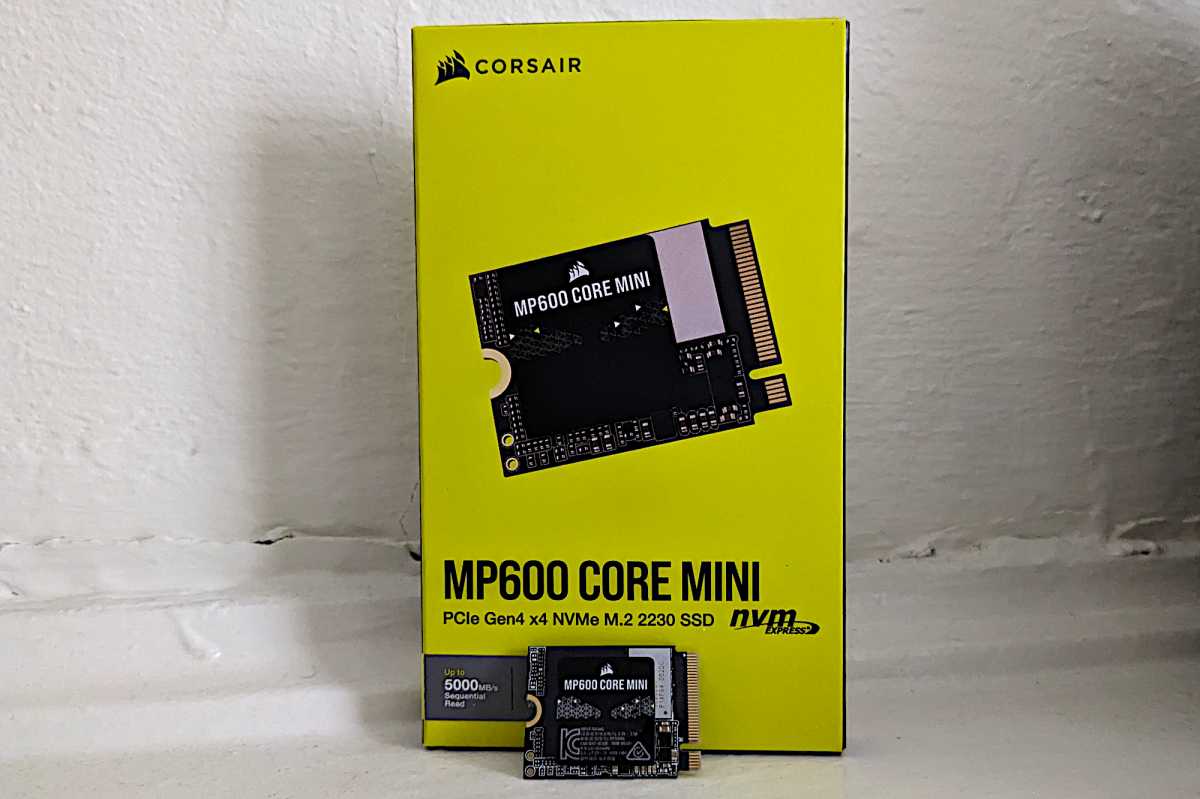
Corsair backs the MP600 Core Mini with a five-year warranty, which is mitigated by a rather parsimonious rating of 250TBW (terabytes that may be written over the life of the drive) per terabyte of capacity.
That said, other QLC designs such as the Sabrent Rocket Q4 and the 2280 Crucial P3 carry even stingier ratings, 225TBW and 220TBW per terabyte, respectively. Longevity doesn’t seem to be a strength of this particular type of NAND.
The only 2230 SSD we’ve tested that utilizes 3-bit, TLC is the WD SN770M, which you’ll see along with the Rocket Q4 in the charts below. It carries a far more reassuring 600TBW rating.
Mentioned in this article
WD Black SN770M
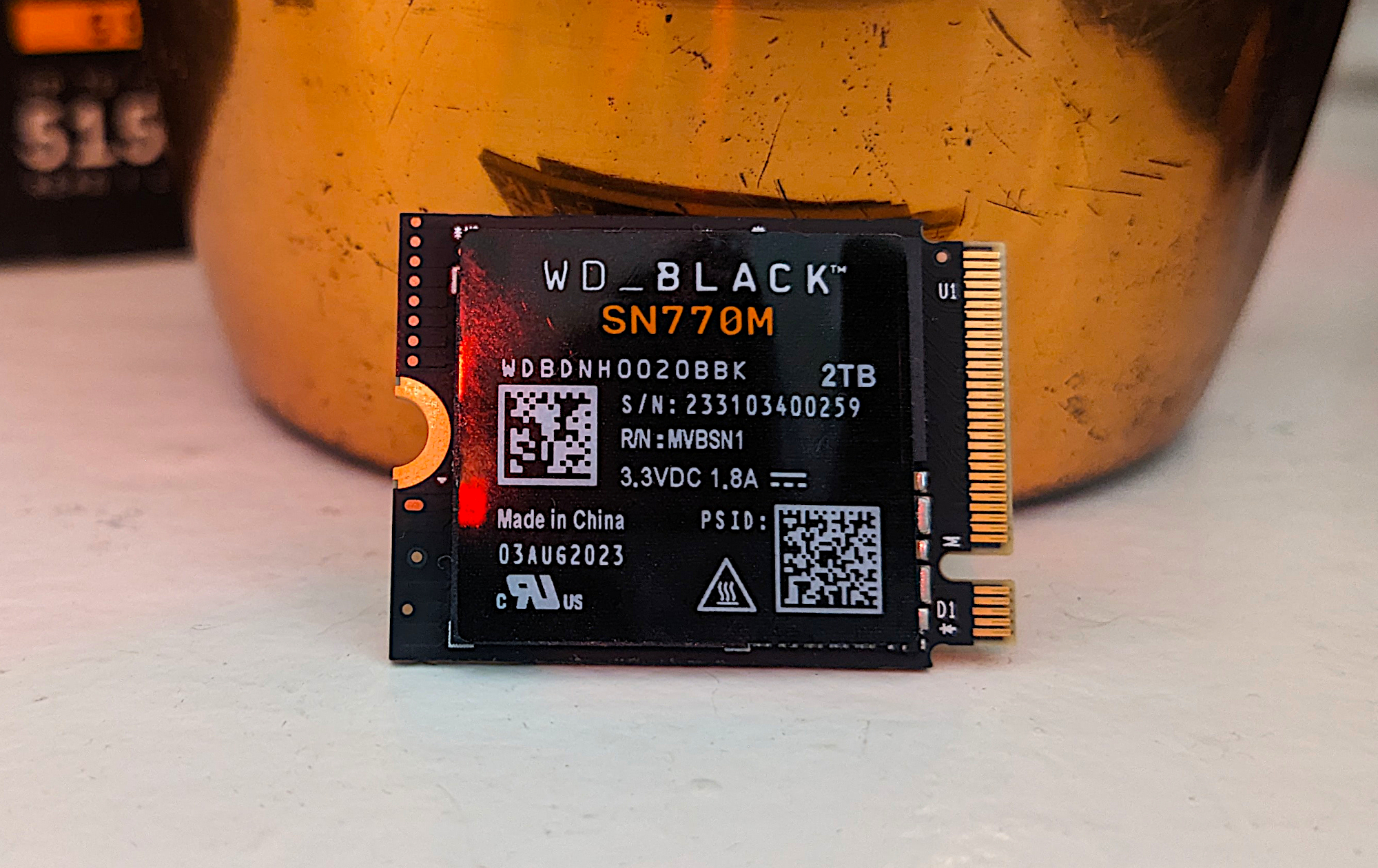
 Read our reviewPrice When Reviewed:500GB: $80 I 1TB: $120 I 2TB: $220 Best Prices Today:$79.99 at Western Digital | $84.99 at Amazon | $84.99 at B&H
Read our reviewPrice When Reviewed:500GB: $80 I 1TB: $120 I 2TB: $220 Best Prices Today:$79.99 at Western Digital | $84.99 at Amazon | $84.99 at B&H
I should note that 250 terabytes is actually quite a lot of data — more than most users will write in five years. Still, it’s not an confidence-inspiring number.
How much does the Corsair MP600 Core Mini cost?
At the time of this writing, the 2TB MP600 Core Mini we tested was available on Amazon for $200 and the 1TB version for $95. You’re of course paying a premium for the form factor, i.e., a drive that will fit in your Steam Deck or Asus ROG Ally. Miniaturization premium or not, the competing WD SN770M was quite a bit cheaper at the time of this writing.
How fast is the Corsair MP600 Core Mini?
If you don’t throw absurd amounts of data at it, as we do in testing, the MP600 Core Mini offers more than acceptable performance. As you can see from the tests below, it’s on par for a QLC/HMB design, and very good at real-world tasks — to a point. A point I’ll describe at the end of this section.
The MP600 Core Mini matched the similarly designed Sabrent Rocket 4 in CrystalDiskMark 8’s sequential tests, but didn’t come close to the SN770M with its TLC NAND.
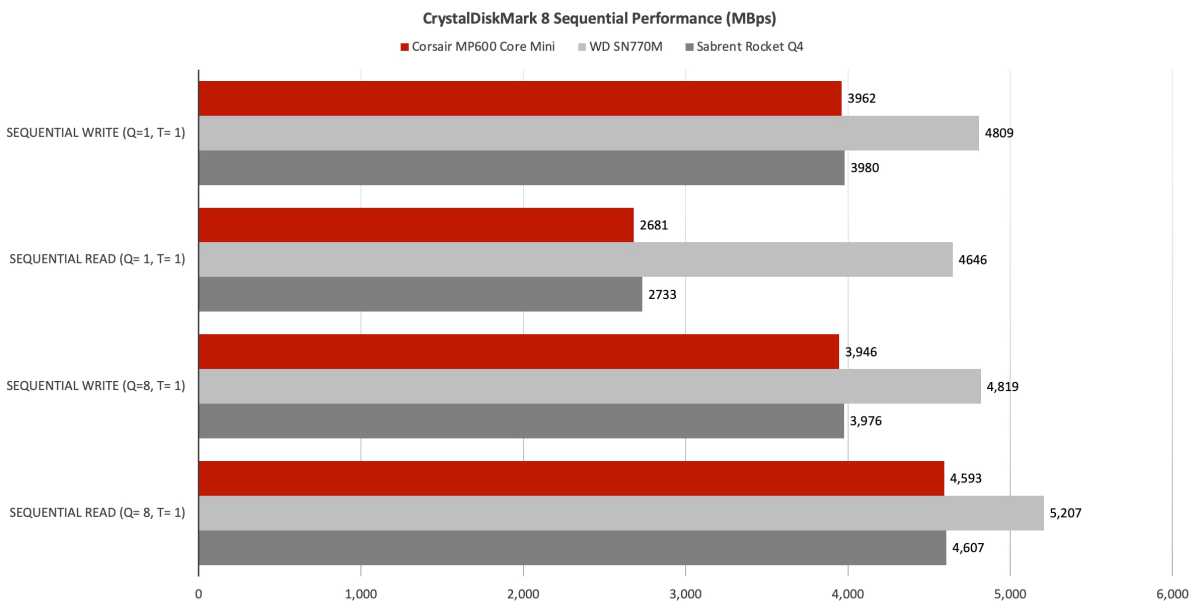
Things were a bit sunnier for the Corsair design in CrystalDiskMark 8’s 4K tests, with the rather inconsistent SN770M faring somewhat poorly in the single-queue write test. Again, the MP600 Core Mini was in a statistical near-dead heat with the Rocket 4.
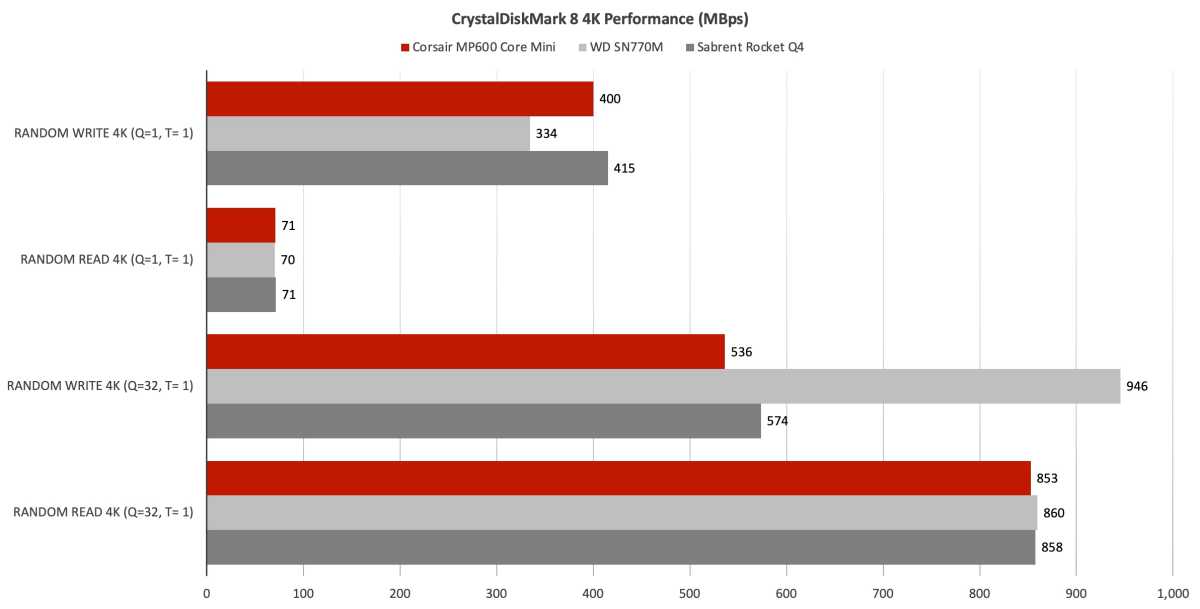
The MP600 Core Mini finally matched the WD SN770M in our 48GB transfers. This performance is also on par with many 2280, DRAM-caching, and even PCIe 5.0 NVMe SSDs. In other words, it’s a very good result — even in the grand scheme.
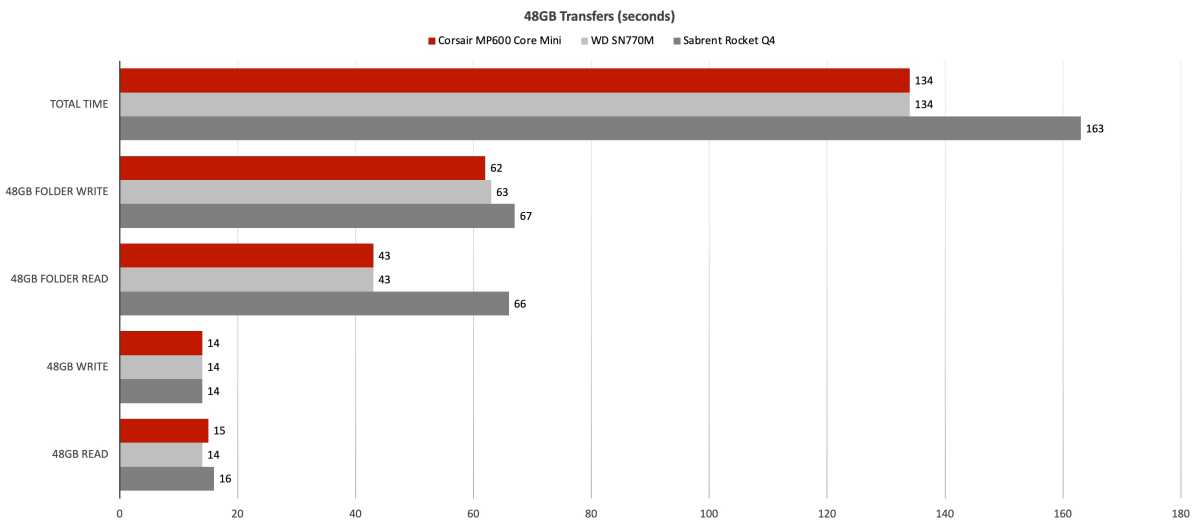
Sweet triumph finally befell the MP600 Core Mini’s in the 450GB write. That’s a lot of data — however, read on, as the drive didn’t sustain this speed for much longer.

No sooner had our drive-filling 1.35TB write (with 450GB already written) commenced, than the MP600 Core Mini’s write speed dropped spectacularly to around 100MBps to 120MBps. That’s slow even for a modern hard drive, but it is actually normal for this type of QLC written natively. You can see the phenomenon below.
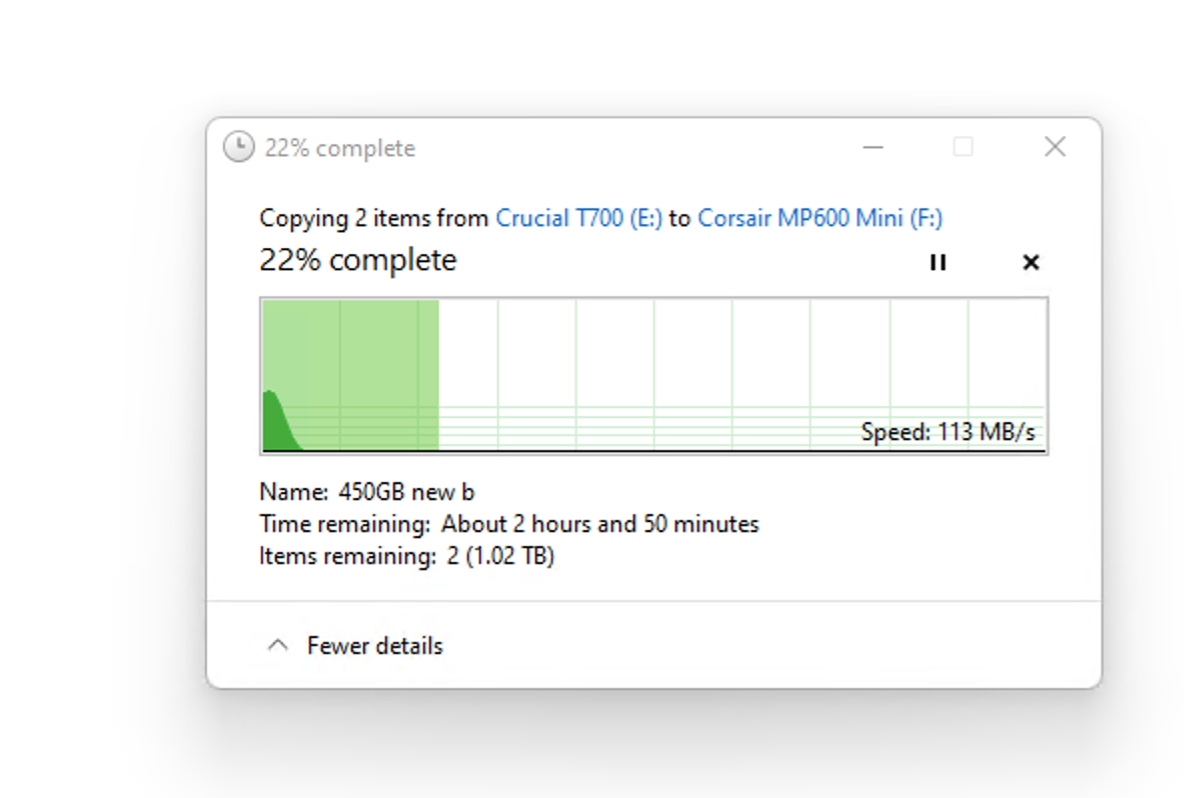
Though it’s extremely, and I mean extremely, unlikely that you’ll experience such a scenario with the MP600 Core Mini in a gaming device, it might make for a long afternoon on a PC. I say go 2280/TLC in any device that allows it.
Should you buy the Corsair MP600 Core Mini?
To answer that question: Yes, if you’re intent is upping the storage capacity of your Steam Deck, Asus ROG Ally, or other small device. But depending on price. At the time of this writing, the better-performing, Best Buy-only SN770M is the cheaper deal. We do, however, expect the price of the MP600 Core Mini to drop significantly in short order. It will have to, to compete.
How we test
Internal drive tests currently utilize Windows 11, 64-bit running on an X790 (PCIe 4.0/5.0) motherboard/i5-12400 CPU combo with two Kingston Fury 32GB DDR5 4800MHz modules (64GB of memory total). Both 20Gbps USB and Thunderbolt 4 are integrated to the back panel and Intel CPU/GPU graphics are used. The 48GB transfer tests utilize an ImDisk RAM disk taking up 58GB of the 64GB of total memory. The 450GB file is transferred from a 2TB Samsung 990 Pro which also runs the OS.
Each test is performed on a newly formatted and TRIM’d drive so the results are optimal. Note that in normal use, as a drive fills up, performance may decrease due to less NAND for secondary caching, as well as other factors. This is less of a factor with the current crop of SSDs with their far faster NAND.
Caveat: The performance numbers shown apply only to the drive we were shipped and to the capacity tested. SSD performance can and will vary by capacity due to more or fewer chips to shotgun reads/writes across and the amount of NAND available for secondary caching. Vendors also occasionally swap components. If you ever notice a large discrepancy between the performance you experience and that which we report, by all means, let us know.
Best Prices Today: Corsair MP600 Mini Core SSD
RetailerPrice
 $79.99View DealCorsair$94.99View DealPrice comparison from over 24,000 stores worldwideProductPricePrice comparison from Backmarket
$79.99View DealCorsair$94.99View DealPrice comparison from over 24,000 stores worldwideProductPricePrice comparison from Backmarket
Author: Jon L. Jacobi, Freelance contributor

Jon Jacobi is a musician, former x86/6800 programmer, and long-time computer enthusiast. He writes reviews on TVs, SSDs, dash cams, remote access software, Bluetooth speakers, and sundry other consumer-tech hardware and software.
Recent stories by Jon L. Jacobi:
SanDisk Desk Drive USB SSD review: High capacity, 10Gbps performanceSK Hynix Tube T31 review: Looks like a USB drive, performs like a SSDTeamgroup Z540 review: A worthy competitor for the SSD performance crown




